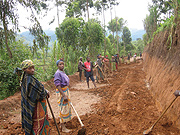Rwanda enjoys a stable relationship with the European Union, enjoying a total of EUR 290 million, of the 10th European Development Fund (EDF) for the period 2008 to 2013.


Rwanda enjoys a stable relationship with the European Union, enjoying a total of EUR 290 million, of the 10th European Development Fund (EDF) for the period 2008 to 2013.
The allocation of this EDF fund is to the Economic Development Poverty Reduction Strategy, (EDPRS), with a special focus on social services such as education, health and water representing 60% of the budget (€ 175 M).
While the two priority areas are rural development (€ 40 M) and infrastructure (€ 50 M).
The EU funded projects are meant to empower the poor Rwandans while helping the country to attain sustainable development.
Some of the projects are unique as they have also been instrumental in reconciling the survivors and perpetrators of the 1994 Tutsi Genocide, at community level.
The projects which include rural and infrastructural development based on an all inclusive capacity development program called HIMO (Haute Intensite de Main d’Ouvre).
This involves local residents in the implementation of a given project.
Residents of a given area provide labour and other resources where possible; it is this HIMO program that has earned EU praises from Rwanda’s poorest; having helped them realise their dreams as well as government’s prayers for reconciliation, as they are implemented by ex- combatants and widows.
One such project is the construction of a 6.2 kilometer concrete road worth Frw 1.9 billion in Gasabo district, aimed at the development of rural-urban parts of Rwanda’s capital, Kigali.
The concrete road that connects Murindi to Kabuga is being constructed by local residents, who also provide building materials like concrete blocks and cement which they make themselves.
According to David McRae, the EU ambassador in Rwanda , such projects are meant for economic empowerment beginning with residents of the area where the project is implemented.
"The less privileged of the society, the widows and ex-combatants need to earn a better living,” he explained in a documentary aired on local television.
Nzabandora Pascal the road construction technician says, "The first phase of the project had 300 workers, 180 widows and 120 ex-combatants. The two groups may sound arch enemies but have learnt to talk and mix freely”.
With little money they earn, about US $3 a day, the ex-combatants and Genocide widows have a new life.
Survivor 34 year old Alice Mugirente was widowed at age 20 and had one child.
"I had lost hope, lost my relatives with a child to take care of, but with the road construction job my life has improved , I am able to save some money,” said Mugirente.
Mugirente being a supervisor, earns Frw 3000, about US$ 6 a day giving her a more privileged position among her co-workers.
However most important of all, Mugirente feels more secure than before; "when I heard the Ex-FAR (Interahamwe) have been demobilized and are coming back to their villages I wished for death, I did not think we could mix and one day find some survivors marrying Ex-FAR.”
Mugirente says the success story about her new job is being able to forgive and laugh with people she had hated most. "We joke and laugh like nothing bad happened between us,” Mugirente muses.
Romance blooms as many forget the previous pain as they fall in love. "After work we meet and freely mix, many have fallen in love while others have taken a step into marriage, some widows are now pregnant, a thing I find good, one needs to take a step in life and forget the past, be happy once again and have hope in life,” said Mugirente.
Those who worked on the Mpazi drainage system in Nyamirambo in the Nyarugenge district have witnessed a true story of survivors marrying ex-combatants.
Mukankundiye Eliminatha is a survivor who after one month working on the drainage system fell for Gatsinzi leonard and in two months time they legally got married.
"We fell in love and I found it necessary to make it public and legalize our marriage,” a beaming Mukandutiye testified.
She is so happy and does not seem to regret anything and so is Gatsinzi.
Paul Jabo, the vice- Mayor in charge of economic development in the Gasabo district is happy that the district has managed to kill two birds with one stone; "it is amazing finding a demobilized RPF soldier and that of EX-FAR, who were once enemies now working together, one lifts a stone and passes it on to the other without hurting him, it is a success story.” he notes.
The road construction and the drainage system are just some of the many infrastructure development projects that are based on the HIMO program that has seen ex-combatants and genocide survivors working together peacefully.
The project also includes rehabilitation support for prisoners on genocide charges; doing part of their sentence in community service has helped in peace building.
For example the prisoners are constructing houses for the under-privileged of the Rutunga sector in Gasabo district, to mention but a few.
Ends


